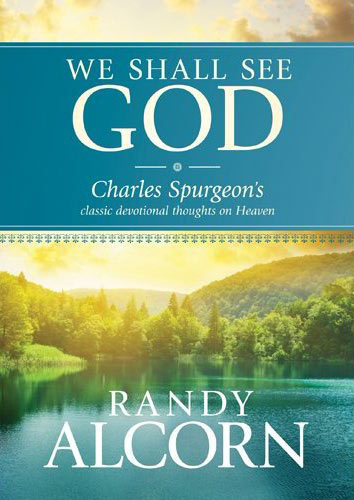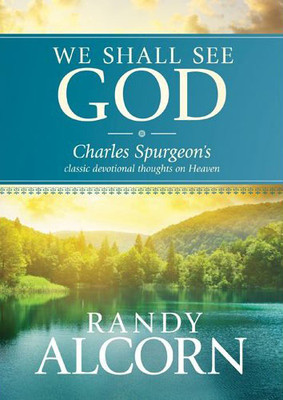
I have owned a copy of this book since it released, and I finally got around to reading it. Now I wish I hadn't waited so long. Time and again, the words of Spurgeon from his sermons and the commentary by Alcorn spoke encouragement and excitement and truth into my heart. What a blessing. I will revisit this book in the future.
— Robin Lee Hatcher, author, posted on bookbub.com
It wasn’t for nothing that Charles Spurgeon was called “the prince of preachers.” In We Shall See God
by Randy Alcorn, you can get a taste of Spurgeon’s eloquence, and of Heaven’s majesty.
We Shall See God is a collection of Spurgeon’s sermons about Heaven. Randy Alcorn has done a masterful job of culling through the prince’s sermons to pull out excerpts that talk about the beauty of Heaven and the horrors of Hell. Randy’s comments following each passage from Spurgeon are wonderfully presented. He doesn’t “talk over” Spurgeon, nor does he simply rehash what Spurgeon already said. He eloquently amplifies or briefly explains.
This book is designed to be used as a 50-day devotional reading. But I’ll be honest with you: I couldn’t put it down! I was so enthralled by Spurgeon’s description of Heaven, that I couldn’t wait to read more. And now I can’t wait to tell others more about Heaven.
Lately there have been so many authors and blogger hypothesizing about Heaven and Hell and the after-life. But Spurgeon doesn’t give us his opinion, he gives us biblical insight. And wouldn’t you much rather hear what the Creator of Heaven has to say about it, than what any mere mortal has to say?
I highly recommend this book to you. You will not only look forward to Heaven even more, but you will enjoy your brief journey on this Earth even more too.
— Craig T. Owens, blogger at craigtowens.com
Randy Alcorn, best-bestselling author of Heaven, compiled a book of Charles Spurgeon’s sermons on heaven and eternity that is sure to become a classic. He introduces readers to this passionate London preacher with excerpts from Spurgeon’s sermons titled, “Will I Be Myself in Heaven?” “Falling Asleep,” “Friendship in Heaven,” and more. Besides other details such as Spurgeon was never delivered from personal affliction, and was blinded by glaucoma five years before his death at age 57. (1834-1892)
When the publisher asked Randy to “supplement Spurgeon’s meditations with some of [his] own thoughts about Heaven,” he “squirmed a little.” Then relented when he learned all royalties would further “Christ-centered, Kingdom causes.”
A brief introduction to Spurgeon’s life and work preface the devotions. One intriguing detail noted that Spurgeon asked his congregation to stay away from evening services “four times a year…so unbelievers could fill the seats and hear God’s word.”
Devotions include sermon titles, their numbers, date used and Bible verse. Alcorn’s views follow Spurgeon’s thoughts. For example, “Dying is but Going Home,” taken from sermon #1892, “Why They Leave Us,” was delivered “three days after the death of his friend and fellow pastor Charles Stanford.”
In it, he “encourages his congregation to view death” as going home and inspires them to act like biblical “David, who washed his face and ate and drank” in the face of death, because, “there is no dying for the saints.” Spurgeon writes of his friend, Charles Stanford, who “drew up his feet and smiled…likewise you and I will depart.”
Alcorn cautions not to “romanticize death, or fear the unknown. Instead, “…set your sights on “Jesus [who] came to deliver us from the fear of death.”
Spurgeon reached millions with his “timeless pearls of wisdom,” much of it out of print today. Thanks to Randy, millions can again be influenced by this passionate and powerful “prince of preachers” through these remarkable devotions. Never before in our nation’s history have we needed more profound spiritual insights than we do today in America’s season of political correctness.
Randy Alcorn has outdone himself with this compilation. Not only is this an excellent devotional, it’s an excellent Bible study resource or meaningful gift for friends and loved ones.
— Gail Welborn, in The Cypress Times, daily online Christian newspaper
I'm not generally a fan of daily devotionals. The readings tend to be like bite-size shortbread biscuits—a verse or two of Scripture appended to a paragraph with a corny anecdote. My appetite runs more to things like rare steak, 9 ounces or more. So when I'm reading devotionally (devoting time to God, and listening to Him), my preference is to read straight Scripture, at least a chapter or two at a time, without prefabricated what-do-you-think-about this-style questions, thoughts-of-the-day, fortune-cookie quotes, cutsie human-interest stories, or any of the other standard daily-devotional gimmicks.
Don't get me wrong: I have nothing against commentaries and study tools, and I use them profusely when I'm studying a text I intend to write or preach on. But when I'm doing purely devotional reading, I prefer to devote all my time and attention to the text itself, so I can hear God's Word without interruption and meditate on it.
Nevertheless, I very much like We Shall See God, a new devotional book on heaven and the afterlife by Randy Alcorn, with copious quotes from C. H. Spurgeon. It is meaty, rich with insight, engrossing, and fresh (even though the Spurgeon excerpts are more than a century old).
As a matter of fact, for my money, it's an even better book about heaven than Alcorn's original bestselling book on the subject.
Alcorn has lightly edited the Spurgeon material to make it more easily readable, and he has done a superb job choosing and reformatting these excerpts. Gone are the three-page-long paragraphs you have to slog through in the sermon volumes. Spelling, punctuation, and some words have been Americanized. Paragraphs have been omitted here and there where it helps to make Spurgeon's point in a more focused way. The editing has been done with proper respect to the material, and without any attempt to alter the sense or substance of what Spurgeon originally said. (Alcorn explains the editing process in his introduction.)
You may very well want to use this book as a daily devotional, and it is plenty nutritious enough for that. Spurgeon's premillennialism comes through wonderfully where he discusses eschatology. Spurgeon's portrayal of heaven is superbly biblical and devoid of speculation. There are also chapters on the reality of God's wrath and the horrors of hell, so this is no syrupy book that might give artificial comfort or false hope to the lost.
I think it is a fine book expounding on what the Bible says about the afterlife, and even if you don't use it as a devotional guide, you will find it a good read. It's going in the doctrinal section of my library, not on that top, out-of-reach shelf where I store most of my devotional books.
— Phil Johnson, blogger at teampyro.blogspot.com




